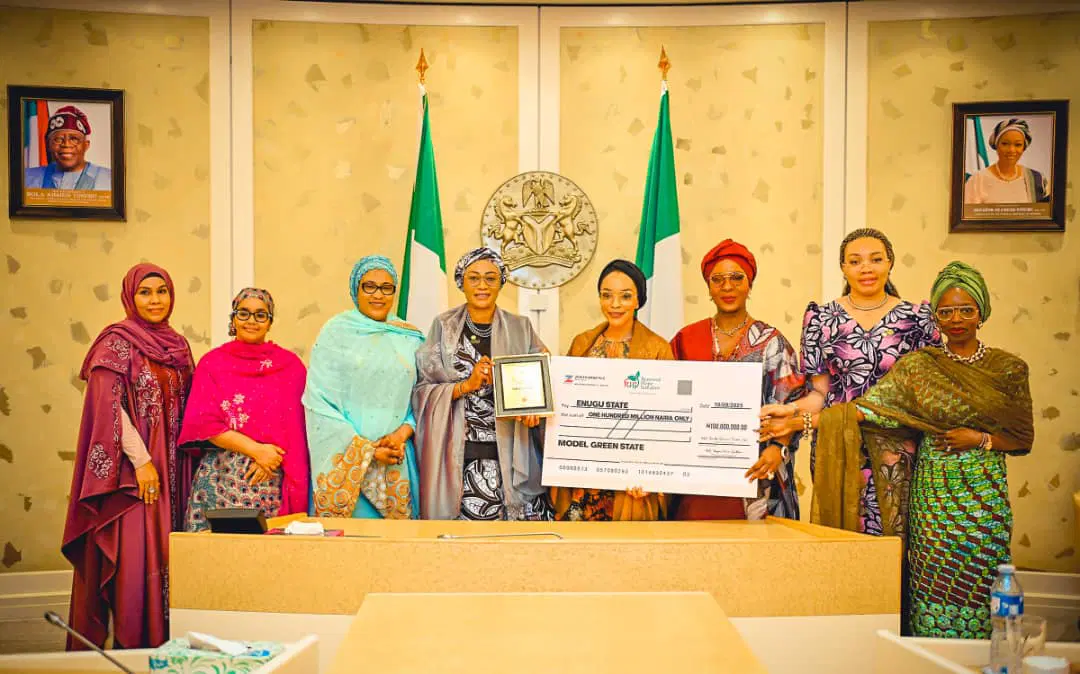Data by the World Bank estimates that poor waste management and environmental degradation cost Nigeria up to 8% of GDP annually, close to ₦13.5 trillion (US $16.8 billion).
Much of this loss derives from lost productivity and climate risks. Across many cities in Nigeria, clogged drainages and egregious heaps of waste are common sights in many Nigerian cities, further worsening the crisis.
Recently, Enugu State earned national recognition for its environmental responsibility at the presidential villa.
The Green Nigeria Challenge—a nationwide competition designed to promote tree planting, environmental cleanliness, and community-led greening—was unveiled by Oluremi Tinubu, Nigeria’s first lady, yesterday.
Enugu State won the top prize of ₦100 million as a reward for its sustained commitment to tree planting and culture of immediate responsiveness to waste and cleanliness.
The challenge, which is themed “Go Green Today for a Greener Tomorrow,” offers ₦20m, ₦50m, and ₦100m to competing households, communities and states, respectively. Enugu’s recognition as a “Model Green State” now sets the benchmark for other states.
Generally, the problem for most states has been weak enforcement. The competitive structure of the Green Nigeria Challenge drives states to take environmental action more seriously.
Tackling Desertification and Waste
In the north, where desertification threatens livelihoods, the household category (family-level participation) requires households to plant at least one tree to qualify.
At the community level, schools, NGOs, and youth groups are encouraged to reclaim degraded spaces (restore abandoned land) into parks and gardens, while states are assessed on the growing of trees along both highways and inner roads.
This mix of household, community, and state-level interventions ensures that responsibility is shared and that every Nigerian has a role to play.
With over 50% of Nigerians now resident in cities, it’s become even more urgent to push for cleanliness to avoid flooding and improve public health.
Adding to this will be the culture of ‘save planet earth’ mindedness it will place in the minds of the people.
Daily living with this awareness will eventually metamorphose into a healthy disposal and waste management culture.
This would also bring about tighter measures and policies against indiscriminate waste disposal as well as unauthorised felling of trees. When age groups, youth organisations and unions take it upon themselves to be on guard against violations, society may begin to see better outcomes.
The Green Nigeria Challenge runs until 2026, with more states, communities, and households expected to compete for recognition.
The plans to establish environmental clubs and environmental societies across various institutions show the government’s intent to embed environmental consciousness in the next generation.
By advancing environmental responsibility at various levels, Nigeria can gradually reverse her poor ecological state. Enugu’s recent recognition points to the fact that a cleaner and greener future is achievable.
Poor waste management and environmental degradation cost Nigeria an estimated 8% of its GDP annually, about ₦13.5 trillion (US $16.8 billion), primarily due to lost productivity and climate risks. Nigerian cities face severe issues with clogged drainages and heaps of waste. However, initiatives like the Green Nigeria Challenge, launched by First Lady Oluremi Tinubu, aim to promote tree planting, environmental cleanliness, and involve community-led greening efforts. Enugu State was recognized nationally for its exemplary environmental actions, winning ₦100 million for its dedication to these efforts.
The challenge, themed "Go Green Today for a Greener Tomorrow," incentivizes participation at household, community, and state levels with varying rewards. The north of Nigeria, particularly vulnerable to desertification, sees households encouraged to plant trees, while communities and states focus on reclaiming degraded spaces and planting along roads. This initiative emphasizes shared responsibility and aims to instill a sustainable environmental mindset in citizens, thereby improving waste management and reducing unauthorized tree felling.
The challenge will run until 2026, and its competitive nature is expected to foster a shift towards stronger environmental policies and culture across Nigeria. The government's efforts are directed at embedding environmental consciousness in the next generation through educational initiatives. Ultimately, such comprehensive actions present a viable pathway for Nigeria to tackle its ecological issues and strive for a cleaner, healthier environment.






